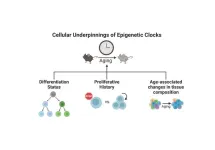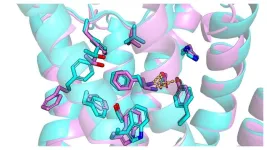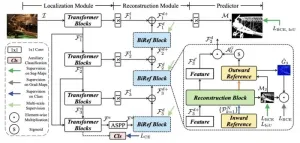(Press-News.org) The anti-cancer drug olaparib may be effective in treating biochemically recurrent prostate cancer without accompanying hormone therapy for men who have mutations in genes such as BRCA2, according to results of a phase II clinical trial of 51 patients conducted at the Johns Hopkins Kimmel Cancer Center and three other sites.
The study was done of men experiencing signs of cancer recurrence after surgical removal of the prostate, as measured by a high level of the protein prostate-specific antigen (PSA). Following treatment with olaparib, 13 participants, including all 11 who had BRCA2 mutations, had a decrease in PSA of at least 50% — a sign that their cancers were receding.
A report about the work was published Aug. 22 in JAMA Oncology. The other participating centers were the University of Nebraska Medical Center in Omaha, the Allegheny Health Network Cancer Institute in Pittsburgh and the Thomas Jefferson University Hospital in Philadelphia.
While most men with localized prostate cancer are cured with surgery or primary radiotherapy, up to 40% will develop a recurrence as measured by a rising PSA, explains lead study author Cathy Handy Marshall, M.D., M.P.H., an assistant professor of oncology at Johns Hopkins. The study was co-led by former Kimmel Cancer Center prostate cancer expert Emmanuel Antonarakis, M.D., who is now associate director of translational research at the University of Minnesota Masonic Cancer Center. He maintains an adjunct professorship at Johns Hopkins.
A common treatment approach for recurrent prostate cancer is androgen deprivation therapy — medication to stop testosterone production. However, many men don’t like taking the drug because the lack of testosterone can lead to side effects such as hot flashes, fatigue or weight gain, Marshall says.
“We have done a number of trials looking for therapies for prostate cancer that are not hormone-suppressing to avoid those side effects,” she says.
Olaparib, a precision oncology drug which blocks the ability of the protein PARP to repair damaged DNA, is approved by the U.S. Food and Drug Administration for treatment of metastatic prostate cancer in combination with hormonal therapy, but it was unknown if the drug would work without the accompanying hormonal suppression, Marshall says.
Investigators enrolled 51 patients in the trial from May 2017 through November 2022. Each participant had biochemically recurrent prostate cancer following radical prostatectomy (surgery to remove the prostate, seminal vesicles and nearby lymph nodes). Among participants, 27 (53%) were considered biomarker positive, meaning that they had mutations in some genes that were more likely to make their cancers sensitive to olaparib. Patients had a mean age of about 64 years and median baseline PSA of 2.8 nanograms per milliliter. Most participants had a Gleason Grade Group 3 and above, meaning they had a high-grade cancer. Some 86% of participants had received radiotherapy after surgery. In patients who had positive biomarkers, alterations in BRCA2 were the most common (11 patients), followed by alterations in the ATM and CHEK2 genes (six patients each).
Participants were treated with 300 milligrams of olaparib by mouth twice daily (without hormonal suppression) until their baseline PSA level doubled, their cancer worsened as determined by imaging or other signs or symptoms, or they had unacceptable side effects/toxicity from the medication. The amount of time participants were on therapy varied — it was more than two years in some cases, Marshall says.
About half (13 of 27 patients) in the biomarker-positive group had a decrease in PSA of 50% or more, including all 11 patients with BRCA2 mutations. The median duration of response was 25 months. The other two PSA responses were seen in participants with a CHEK2 mutation and an ATM mutation. No PSA responses were seen among the 24 men in the biomarker-negative group, leading the study authors to conclude that the therapy should not be considered for those patients in the future.
The median PSA progression-free survival (the length of time before PSA worsened) was 19.3 months overall and 22.1 months in the biomarker-positive subset, compared with 12.8 months in the biomarker-negative subset. The median metastasis-free survival (time from treatment to detection of metastasis) was 32.9 months overall and 41.9 months in the biomarker-positive subset, compared with 16.9 months in the biomarker-negative subset.
Also, the median time to next anti-cancer therapy was 15.4 months overall and 22.7 months in the biomarker-positive subset, compared with only 2.4 months in the biomarker-negative subset.
The most common adverse events with olaparib were fatigue, nausea and leukopenia (fewer than normal infection-fighting white blood cells).
“This study is a breakthrough because it is the first trial to show that a non-hormonal drug can induce durable complete remissions in recurrent prostate cancer patients with BRCA2 mutations — one of the most aggressive subtypes of this disease,” Antonarakis says. “It is a true paradigm shift, because now we can offer a non-hormonal precision therapy to these patients that is safe and effective while avoiding the side effects caused by hormonal deprivation.”
Study co-authors included Jiayun Lu, Lia Oliveira, Hao Wang, Channing Paller, Mark Markowski, Samuel Denmeade, Serina King, Rana Sullivan, Mario Eisenberger, Michael Carducci and Tamara Lotan of Johns Hopkins. Additional co-authors were from Veracyte in San Francisco.
The study was supported by AstraZeneca, Foundation Medicine and Veracyte. Marshall was supported by the National Cancer Institute (grant P30 CA006973), the V Foundation, a Robert A. Winn Career Development Award and the Prostate Cancer Foundation. Antonarakis was supported in part by the National Institutes of Health/National Cancer Institute (grant P30 CA077598) and the Department of Defense (grant W81XWH-22-2-0025).Marshall receives honoraria from Tempus, Dendreon, ObsEva, Astellas, MashupMD and Community Health Marketing, and grant funding from AstraZeneca. These relationships are managed by The Johns Hopkins University in accordance with its conflict-of-interest policies.
END
Precision drug olaparib may be effective without hormone therapy for some men with biochemically recurrent prostate cancer
2024-08-22
ELSE PRESS RELEASES FROM THIS DATE:
Americans face disparities in exposure to tobacco on streaming platforms
2024-08-22
Tens of millions of Americans are being exposed to tobacco content on streaming services, according to new research from The University of Texas MD Anderson Cancer Center. The researchers found that the odds of encountering tobacco products being advertised, marketed or promoted on these platforms increased based on race, ethnicity, socioeconomic status and smoking habits.
The nationally representative study, published today in JAMA Network, revealed an estimated 12.4% of American adults were exposed to tobacco promotion on streaming services. Exposure was highest among those with a high school education or less (16.4%), Black/African American respondents (19.4%), ...
Elinzanetant for the treatment of vasomotor symptoms associated with menopause
2024-08-22
About The Study: In two pivotal phase 3 clinical trials, elinzanetant, a selective neurokinin-1,3 receptor antagonist, demonstrated statistically significant reductions in vasomotor symptoms (VMS) frequency and severity vs placebo in postmenopausal individuals with moderate to severe VMS. Elinzanetant also significantly improved sleep disturbances and menopause-related quality of life vs placebo; the safety profile was favorable.
Corresponding Author: To contact the corresponding author, JoAnn V. Pinkerton, ...
Trends in children’s exposure to food and beverage advertising on television
2024-08-22
About The Study: In this repeated cross-sectional study of children’s exposure to food-related television advertisements, exposure via children’s programming decreased substantially. However, most advertisements seen were still for unhealthy products, and exposure from all programming remained substantial. Findings of more than 90% of advertising exposure not from children’s programming and more than 1,000 food-related advertisements seen per year suggest the need for government regulations based on time of day rather than programming.
Corresponding Author: To contact the corresponding author, Lisa M. Powell, PhD, email powelll@uic.edu.
To ...
Disparities in exposure to tobacco on television or streaming platforms
2024-08-22
About The Study: In this study of the prevalence of exposure to tobacco advertisements on TV or streaming platforms among U.S. adults, disparities in exposure by race or ethnicity, education level, and smoking status were identified. These findings underscore the need for targeted public health interventions and regulation to address these disparities and reduce the impact of tobacco advertisements on vulnerable populations.
Corresponding Author: To contact the corresponding author, Sanjay Shete, PhD, email sshete@mdanderson.org.
To access the embargoed study: Visit our For The Media website at this link https://media.jamanetwork.com/
(doi:10.1001/jamanetworkopen.2024.27781)
Editor’s ...
How thyroid hormone fuels the drive to explore
2024-08-22
Thyroid hormone plays a key role in regulating a range of physiologic functions, including metabolism, temperature, heart rate, and growth. It accomplishes this impressive array of activities by interacting with almost every organ system in the body. Yet despite a long history of research on how thyroid hormone influences different organs, its effects on arguably the most crucial organ — the brain — have remained shrouded in mystery.
Now, scientists at Harvard Medical School have gained ...
Higher thiazide doses shown to reduce kidney stone events
2024-08-22
Higher thiazide doses are associated with greater reductions in urine calcium, which in turn correlate with fewer symptomatic kidney stone events, according to a Vanderbilt University Medical Center (VUMC) study published in JAMA Network Open.
Thiazide diuretics, commonly prescribed to prevent kidney stone recurrence, are drugs that act directly on the kidneys to promote diuresis (urine flow) by inhibiting the sodium/chloride cotransporter located in the distal convoluted tubule of a nephron ...
Reading your biological age in your blood or saliva? It’s not as simple as that
2024-08-22
How old are you, really? Your chronological age is the number of years you have been alive. Your biological age is how old your cells are which scientists believe may better assess one’s age-related health and disease risk. People biologically age at different rates, depending on genetic and environmental factors, so that a person’s chronological age does not necessarily match their biological age. In recent years, direct-to-consumer biological age tests have become increasingly accessible and popular as interest has increased ...
Pong prodigy: Hydrogel material shows unexpected learning abilities
2024-08-22
In a study published today (22 August) in Cell Reports Physical Science, a team led by Dr Yoshikatsu Hayashi demonstrated that a simple hydrogel - a type of soft, flexible material - can learn to play the simple 1970s computer game ‘Pong’. The hydrogel, interfaced with a computer simulation of the classic game via a custom-built multi-electrode array, showed improved performance over time.
Dr Hayashi, a biomedical engineer at the University of Reading’s School of Biological Sciences, said: "Our research shows that even very simple materials can exhibit complex, adaptive behaviours typically associated with living systems or sophisticated AI.
"This ...
AI can speed up drug development
2024-08-22
Artificial intelligence (AI) can help identify molecules that could serve as new drugs for mental health disorders. AI can be used to predict the three-dimensional structures of important receptors and thereby speed up the development of potential drugs. This is the result of a new study from Uppsala University published in Science Advances.
In drug development, experimental methods are often used to determine the three-dimensional structures of target proteins and to understand how molecules bind to them. This information is needed to design drug molecules efficiently. However, the process to determine structures can be demanding, meaning this ...
Bilateral reference framework for high-resolution dichotomous image segmentation
2024-08-22
A research team has developed a computer vision technique that can perform dichotomous image segmentation, high-resolution salient object detection, and concealed object detection in the same framework. Their novel bilateral reference framework (BiRefNet) is able to capture tiny-pixel features and holds potential for a wide range of practical computer vision applications.
The work is published in the journal CAAI Artificial Intelligence Research on August 22.
In computer vision research, ...





